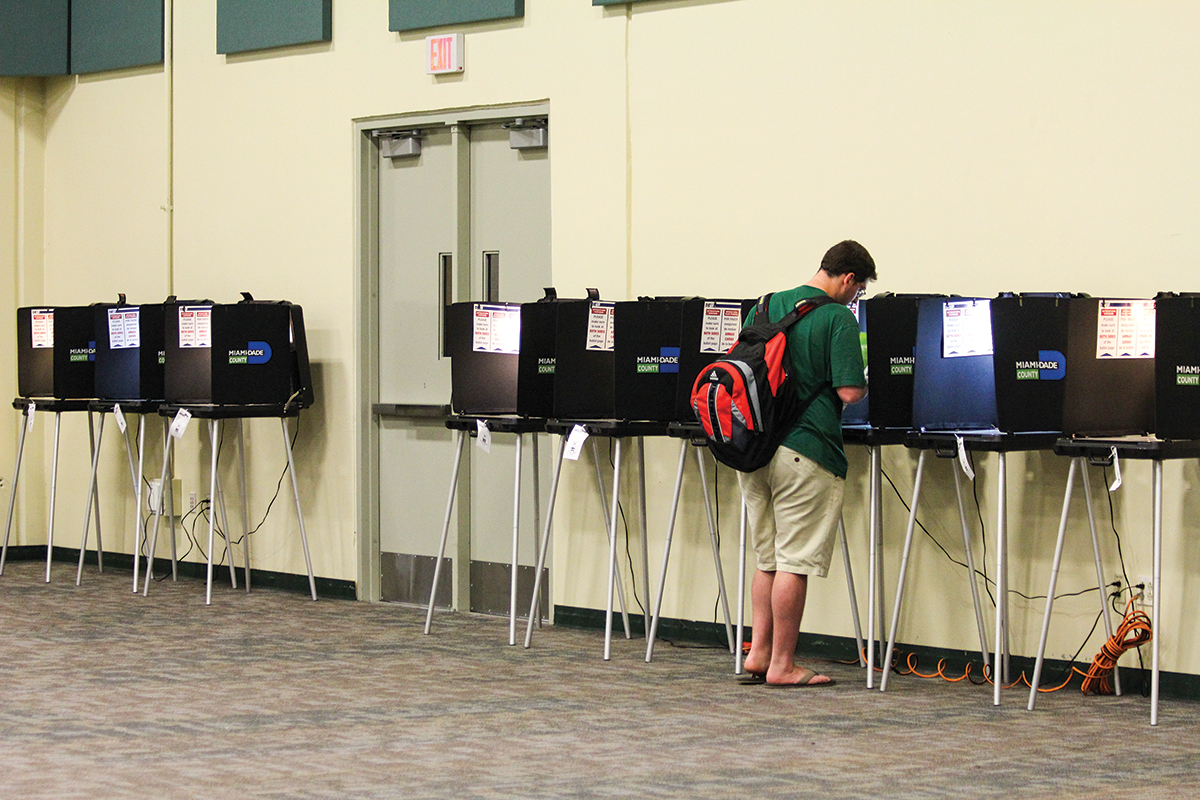
As students filed out of the BankUnited Center (BUC) on Super Tuesday, many shared a common choice for the presidential candidate of their registered party. Most of the people who voted at the BUC were casting their support for Democratic candidate Bernie Sanders or Republican candidate Marco Rubio. Despite the support from those voting on the University of Miami’s campus, both candidates would ultimately lose the state to Hillary Clinton and Donald Trump, the front-runners of their respective parties.
While 1137 registered voters were expected to turn up to the BUC, according to the Miami-Dade County election analysis, only 42.48 percent of them showed up. Among the Miami-Dade County precincts, this was a higher turnout than those of most precincts, with an average turnout of 29.29 percent in the 783 precincts.
Sanders’s popularity among the younger voters around the nation has been apparent, and that trend has continued in the BUC precinct. With 214 registered democratic voters, 51.87 percent of the ballots went toward Sanders, edging out competitor and eventual winner Clinton, who received 44.86 percent of the votes. The remaining 3.27 percent went to Martin O’Malley, who dropped out of the race in February but was still registered on ballots.
Students who came out of the BUC were strong in their support for Sanders, who they believed would inspire change. Daniel Loumpouridis, a freshman majoring in music business, voted for Sanders because he felt that Clinton was mimicking his policies.
“Hillary Clinton in the debates … She will say whatever she thinks will make you like her better, which is why she is leaning more toward the left to get more of Bernie’s platform … And I don’t really feel like voting for a robot that will not do anything,” Loumpouridis said. “[Sanders] is actually going to make a difference.”
The first-year voter chose to register as a Democrat because “all the Republican candidates are soulless,” Loumpouridis said.
Nelta Timothee, who is majoring in human and social development at UM, voted for Sanders because of her trust in him. She said that Clinton seemed “iffy” to her.
“[Sanders] seems very honest to me apart from the other candidate. He feels like he is for the people, and knowing that he shares the same history and human rights with those that aren’t particularly rooted from America, he seems as if he shares our history and he knows the struggles and battles,” Timothee said.
Young voters have been strong supporters of Sanders in past primary elections as well. According to CNN, polling in Michigan last week found that 81 percent of Democratic voters between the ages of 18-29 favored Sanders. A similar trend presented itself in New Hampshire, where 83 percent of that voter demographic voted for Sanders.
Despite Sanders’s popularity at UM, a single precinct was not nearly enough to make a difference. Miami-Dade County as a whole was strongly in Clinton’s favor, giving her 74.81 percent of all votes and helping to pave the way for her victory in the statewide primary.
On the Republican side, Rubio garnered a strong presence from voters at the BUC, with almost 56 percent of ballots cast for him. The 44-year-old Florida senator and Cuban American seemed to be the most attractive option out of the other Republican candidates, especially in a diverse location like Miami.
Marissa Salas, a businesswoman who lives near UM’s campus, voted for Rubio at the BUC.
“Our values are aligned. He is capable of creating change,” Salas said. “Trump will only create violence and chaos.”
Citizens of Miami-Dade County also felt that Rubio was the correct choice, as he was the leading Republican candidate with 62.75 percent of votes cast in his favor. But despite overwhelmingly winning the county, the state of Florida would eventually pick Trump as their primary candidate, ousting Rubio out of the race as he later suspended his campaign that night. Trump won 23.51 percent in the county, the only one won in Florida that he failed to win.
Timothee and Loumpouridis also had similar things to say about the business mogul, with the latter calling him “soulless.”
“Trump is a very racist man, to see a candidate like him is running, he brings out a lot of the bad side in America and it is sad to see what he is doing,” Timothee said. “If he actually wins as president, it will be a sad case for America and it will show that we really aren’t for the freedom of the people.”
During the G.O.P. presidential debate last week at the BUC, more than 100 protestors, including students, chanted, “Donald Trump has got to go.”
Alumnus Nicolas Sage Giordano, now a teacher in Miami-Dade County public schools, said that students play an integral part in the voting process.
“[Students are] often engaged in social discourse, [with] their ideas fresh and passion abundant. Without their enthusiasm, our society falls victim to an intellectual stagnation, and progressive thinking is seen as far-fetched. They will also be the demographic who will live the longest with consequences of the decisions made by our elected officials,” Giordano said.
Throughout the day on campus, students were encouraging and asking as many people as they could if they voted. Student organization UM Get Out the Vote also made efforts to register students as voters, registering 262 new voters, according to them.
“Voting is the foundation of a true democracy. The people of a democratic country have to be able to choose the representatives that are appointed to create the law of the land,” Giordano said. “However, this ability is not without the responsibility we as citizens share to elect officials that reflect the will of the people.”
More voting results in Miami-Dade County can be found at www.miamidade.gov/elections.





